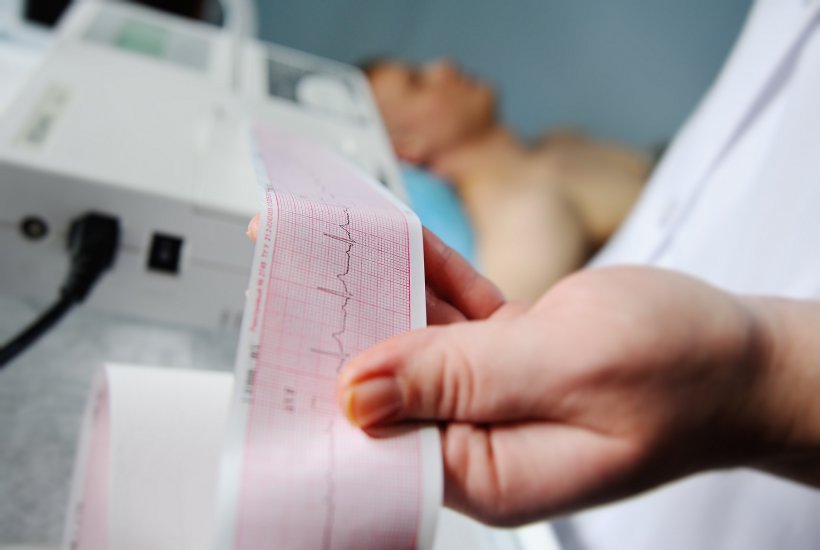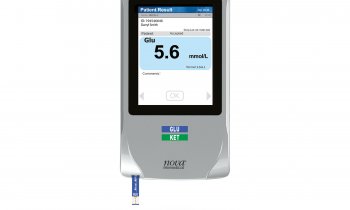Source: Fotolia/Evgeniy Kalinovskiy
Article • Mobile cMyC analysis
The future POCT heart attack test
Experts report that a new blood test to diagnose heart attacks could be carried out on a hand-held device in the not-too-distant future. The test, devised by a team at Kings College London, uses similar technology to the troponin test, but instead analyses cardiac myosin-binding protein C (cMyC).
Report: Mark Nicholls

In research presented at the British Cardiovascular Society conference in Manchester, UK, this June, Dr Tom Kaier, BHF Research Fellow, explained that levels of cMyC in the blood increase more rapidly after a heart attack and to a higher extent than troponin. With this offering the opportunity to rule out a heart attack in a higher proportion of patients instantly, the research team believes it has a role in providing a swift diagnosis in Accident & Emergency (A&E) departments. Scientists are optimistic that this relatively straightforward test could be used as a hand-held point of care test (POCT), and avoid samples being sent to the laboratory.
cMyC outperformed troponin
Now that we know this test is sensitive enough to give an almost immediate heart attack diagnosis, we need to work on developing a testing device
Tom Kaier
Kaier, who was among the lead researchers, emphasised the importance for doctors and patients to know, as early as possible, who has had a heart attack and who has not. ‘Now that we know this test is sensitive enough to give an almost immediate heart attack diagnosis,’ he said, ‘we need to work on developing a testing device.’ As work on developing a POCT device continues, the team hope that it could be used in wards – or ambulances – within five years, replacing time-consuming despatch of samples to hospital labs.
Trials of the test have been conducted around Europe by international collaborators. In Denmark, blood was taken from 776 patients travelling to hospital by ambulance, which the King’s College London researchers then tested for cMyC protein. In patients who had suffered heart attacks, Kaier said, the protein was present in high enough concentrations 95% of the time for an on-the-spot diagnosis.
The cMyC test outperformed the existing troponin test, which diagnosed only around 40% of patients in this way, mainly because troponin takes longer to reach detectable levels in the blood after a heart attack. ‘A stand-out feature is cMyC’s ability to more effectively triage patients,’ Kaier said. ‘This distinction is likely related to the documented greater abundance and more rapid release profile of cMyC. If used on a POCT platform, cMyC could significantly improve the early triage of patients with suspected AMI.’

Source: Fotolia/Evgeniy Kalinovskiy
Better rule-in and rule-out rate
Figures show that more than 65% of people who attend A&E with chest pain have not had a heart attack, though all will receive an ECG and a blood test to measure troponin levels. With the cMyC blood test shown by the KCL team to have a better rule-in and rule-out rate for heart attack, the research team believes this will be a valid tool in reassuring patients sooner and avoiding unnecessary hospital stays for further tests. In part, the research has been funded by the British Heart Foundation, which said the initial results from the cMyC test look ‘very promising’ for patients and acknowledges that it could lead to quicker diagnosis and treatment, or see patients reassured and discharged. However, BHF Associate Medical Director Professor Jeremy Pearson stressed that further research was necessary before cMyC could be recommended as a replacement for the troponin test.
Profile:
Dr Tom Kaier is a BHF Research Fellow, having previously been a Specialist Registrar in Cardiology at Barts Health NHS Trust and the Royal Free London NHS Foundation Trust in the UK. He completed his medical training in 2008 at Innsbruck Medical University in Austria, with distinctions in medicine, dermatology, ENT, psychiatry, obstetrics & gynaecology and forensic medicine. He was also a finalist in the Young Investigator Prize Competition, held in parallel with the BCS conference, for his work with the cMyC project.
27.08.2018











